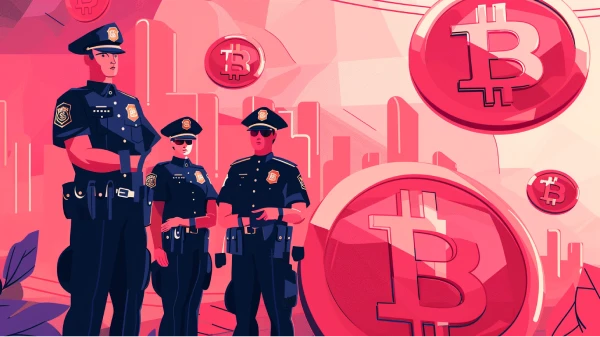Is Bitcoin Legal In the U.S.?
The Bitcoin protocol has never been illegal in the United States. Bitcoin is legal and regulated. Multiple federal government agencies and state regulators have the authority to enforce Bitcoin-related legislation. State governments have the authority to enact laws that govern in-state Bitcoin markets and require licenses for Bitcoin business activities. U.S. states feature different regulatory regimes and vary in their comprehension of Bitcoin as money. As a result, some states are more bitcoin-friendly than others.
Is Bitcoin Illegal In the U.S.?
Bitcoin is not illegal in the United States. To make it illegal, the government might consider banning or seizing privately-owned bitcoin. Both of these possibilities are difficult and unlikely to be successful.
Can Bitcoin Be Seized?
Unlike gold, which is susceptible to mass confiscations because it is physically challenging to hide, secure, or transport, bitcoin is resistant to confiscation. Even if the U.S. President attempted to confiscate or ban bitcoin, as President Franklin Roosevelt did with gold under Executive Order 6102, the attempt would be futile. No amount of physical force or legal coercion can transfer bitcoin from one party to another without the corresponding private keys. Since private keys are merely large numbers, they can be hidden or secured in many ways.
➤ Learn more about why bitcoin can not be seized by the government.
Can Bitcoin Be Banned?
The Bitcoin network is the most accessible financial system ever created, requiring only an internet connection and a bitcoin wallet. Bitcoin is a global network with users geographically distributed across the world. Anyone can broadcast and process transactions from any location, which means that any single government would find it extremely difficult to eliminate Bitcoin usage within their borders. Because Bitcoin is a decentralized internet protocol, banning Bitcoin would be akin to banning the internet itself.
➤ Learn more about why bitcoin can not be banned by any single entity.
Legislation and regulation can govern Bitcoin markets, but making the Bitcoin network illegal would be incredibly difficult without a coalition of governments preventing internet access. Even then, there are some ways to transact with bitcoin without using the internet. Moreover, the increasing use of tor nodes makes the network more impervious to government tracking and, therefore, more difficult to shut down.
Regulating Bitcoin Markets In the U.S.
Bitcoin exhibits the best characteristics of many different assets. Bitcoin can be viewed as property, a store of value, or even a medium of exchange, similar to any other currency. Accordingly, government agencies have struggled to reach a consensus on consistently and unambiguously defining Bitcoin throughout the regulatory language.
Bank Secrecy Act
The Bank Secrecy Act (BSA) requires fiat financial institutions to adopt thorough Anti-Money Laundering (AML) programs. The BSA does not make bitcoin illegal. Bitcoin exchanges, money transmitters, and other trading platforms must comply with the BSA. However, individuals and entities who accept bitcoin as payment are not money transmitters, and therefore are not governed by the BSA.
Securities and Exchange Commission
The The Securities and Exchange Commission (SEC) cannot make Bitcoin illegal. The SEC’s jurisdiction extends to all securities, including investment contracts, stocks, and bonds. Neither Bitcoin the protocol nor bitcoin the money is a security because it does not pass the Howey test. The Howey test sets forth elements to determine whether a particular transaction is an investment contract. An investment contract involves allocating capital to a common enterprise with the expectation of profit solely from the efforts of another. The SEC also monitors investment companies, including mutual funds, money market funds, and exchange-traded funds. Some Bitcoin brokerages and exchanges may also fall under this category.
Commodity Futures Trading Commission
The Commodity Futures Trading Commission (CFTC) regulates risk management, or derivative, markets for commodities. A commodity is any product of trade or commerce that can be processed and resold. Bitcoin is considered a commodity by the CFTC. The CFTC has the legal authority to enact policy or create frameworks regarding the legality of bitcoin derivatives products but does not have the authority to make bitcoin or the Bitcoin protocol illegal.
– CFCT guidelines for Bitcoin futures markets.
Mutual funds and ETFs that choose to offer bitcoin derivatives—including forwards, futures, and options-–are subject to CFTC jurisdiction. Overall, the CFTC is more concerned with the broader category of digital asset derivatives than bitcoin specifically.
Internal Revenue Service
The IRS cannot make Bitcoin illegal. According to Notice 2014-21, the IRS considers bitcoin to be property for tax purposes. The amount and type of tax that bitcoin is subject to during each tax period depends on the investor’s cost basis, the bitcoin’s value, and how many bitcoin were sold during the period. Today, IRS Form 8949 requires taxpayers to disclose any virtual currency activity. On IRS Form 1040 Schedule-D, investors report information about their tax lots, capital gains, and capital losses from the brokerage or exchange.
➤ Learn more about complying with IRS bitcoin tax accounting standards.
Is Bitcoin Legal In China?
The governments of China, India, Nigeria, and other authoritarian regimes have purposefully limited their citizens’ access to Bitcoin. In 2013, China prohibited financial institutions, including banks and payment processors, from participating in Bitcoin. In 2017, the Peoples Bank of China (PBOC) extended the ban to exchanges offering bitcoin and other tokens. China has also banned Initial Coin Offerings (ICOs) in an effort to protect the yuan’s dominance as a domestic legal tender. None of these bans were effective, and Bitcoin trading and mining were massive and successful industries in China until 2021.
Mining Exodus
In June of 2021, the local government of Sichuan banned bitcoin mining and significantly restricted its citizens’ ability to trade virtual currencies. Now, mining bitcoin in Xinjiang, Inner Mongolia, Sichuan, and Yunnan provinces is also banned. Estimates report that China accounted for at least 65% of the network hash rate before the mining ban.
➤ Learn more about why Bitcoin can not be banned.
A year later in May 2022, it was estimated by the Cambridge Centre for Alternative Finance that China remains the second biggest mining hub in the world. Following the mining ban in China, there has been an increasing amount of legal activity around Bitcoin mining specifically.
Key Takeaways
- Bitcoin is considered property, similar to real estate, by the IRS.
- Bitcoin is a commodity, like gold, silver, and other metals, according to the CFTC.
- According to the SEC Bitcoin does not represent an investment contract, and therefore is not a security.
- The SEC may consider other digital assets and tokens to be securities.


